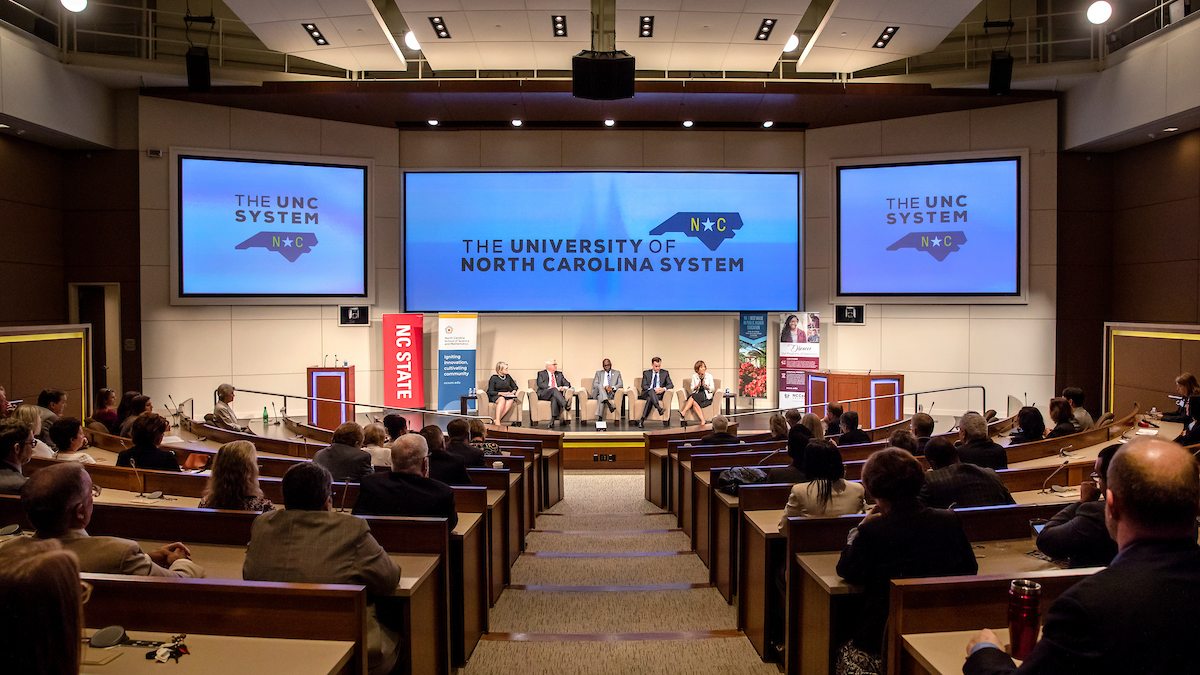Spellings announces a new innovation lab to improve student success
Chancellor Carol L. Folt, along with the chancellors from the other UNC System institutions in the Triangle, joined System President Margaret Spellings for a discussion about the powerful tie between access to higher education and an opportunity for a better life.

In the years ahead, nearly every North Carolinian will need some form of education beyond high school.
To help make sure that need is met, UNC System President Margaret Spellings on Monday, June 4, announced the launch of the Student Success Innovation Lab supported with $3 million from the John M. Belk Endowment and the ECMC Foundation.
Spellings made the announcements at SAS, a Cary software company, during her seventh and last stop on a statewide State of the University Tour.
Chancellor Carol L. Folt, along with the chancellors from the other UNC System institutions in the Triangle, joined Spellings for a discussion about the powerful tie between access to higher education and an opportunity for a better life.
In her progress report of the UNC System, Spellings said that because of support from the N.C. General Assembly, tuition costs across the UNC System campuses have generally been flat or falling while enrollment for Pell Grant-eligible students has grown by nearly 20 percent each year since 2011.
But more must be done, Spellings said.
Children born into poverty in the South have strikingly low odds of bettering their lives, and rural communities in North Carolina are being left behind despite the state’s growing economy. “The pie is growing but not everyone is getting a slice,” Spelling said.
The student success innovation lab will pilot promising ideas at all of the system’s 17 member institutions and connect other UNC institutions to rigorously evaluate them, Spellings said. Work on the initiative began last Friday with a gathering of faculty from across the UNC System.
“Higher education is built around the idea that evaluation, inquiry and debate, centered on facts and data, advance society,” Spellings said. “We must apply that approach to our own operation and use information and research to better teach and support our students.”
Spellings also announced the launch of a financial aid study group in partnership with the North Carolina Community College System with the goal of making it “simpler, more accessible and, potentially, more expansive,” she said.
“It is one of our most powerful tools and we must strengthen it if we are to make our nation’s most important pathway to opportunity less of a high-stakes gamble for our most vulnerable students,” Spellings said.
During a panel discussion, Folt cited the strategic use of financial aid as a driving factor behind Carolina’s high graduation rate, which is second only to the University of Virginia among public universities in the country. “We can apply it to people who are at greatest need at the moment they are at greatest need,” Folt said.
During a discussion on upward mobility, Folt said the economic impact that Carolina has on the state is not limited to the Triangle or to the students who earn degrees and have successful careers. Folt pointed to the $1 billion of external research funding that Carolina generates each year and how that money leverages an additional $7 billion of economic activity throughout North Carolina each year. This activity, in turn, has added good-paying jobs and spread prosperity throughout the state.
Spellings also singled out Folt and UNC-Chapel Hill for lending institutional support to the Institute of Politics, which seeks to engage and inspire students to pursue careers in politics and public service. Started by Carolina students and now supported by the institution, the IOP will be the first of its kind at a public university, joining peers at institutions like Harvard and the University of Chicago, Spellings said.
Spellings said she looked forward to working with the IOP to host discussions in the coming year that advance “strong and diverse debate on our campuses.”
“It seems like more and more there is an ignorance of history, a disregard for the truth and a dismissal of expertise,” Spellings said. “In that environment, what we do every day as educators in public institutions matters. We must stand behind the core values of free expression, intellectual diversity and patient engagement with new ideas.”




